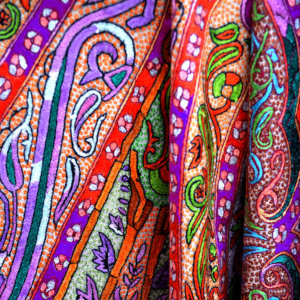
Basically the word Sozani is a Persian derivative and means needle and sozankari means the needle work. The person who performs this craft is called the sozankar. There are similar words in Kashmiri lexicon. For example Sozan in ancient Kashmiri language meant a wise man. So, if we consider the Kashmiri word ‘Sozan’ as the origin of the Sozani then it means a craft performed by the wise men. Subsequently, it has become synonymous to the craft form in which embroidery is performed by the skillful traditional Sozani embroiderers of Kashmir, using motifs depicting geography of the land through coloured threads and a fine needle work. The process involves selection of the pattern and tracing of it subsequently on to the fabric surface to be embroidered. The traced pattern is first filled in with embroidery starting with individual motifs of flowers, then finished with defining the outlines and finally the continuous lines that connect these motifs. A single patch is done first and then repeated after it is approved.
The historians unanimously believe that this Sozani has been introduced and improved by the people who came to Kashmir in 14th Century in order to save themselves from the persecution of the then Tyrant rulers in Central Asia. The most respectable personality who visited Kashmir in 14th Century was Mir Saiyyed Ali Hamadani who is considered to be the founder of organized Islam in Kashmir. The Sayyeds brought with themselves new ideas, arts and crafts and architecture.
